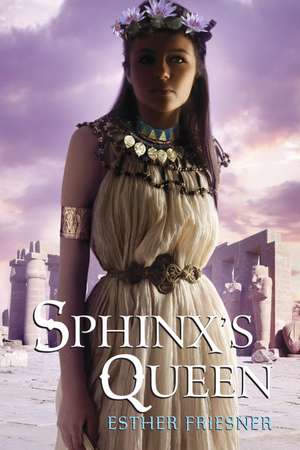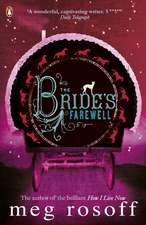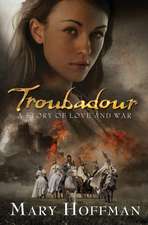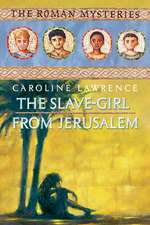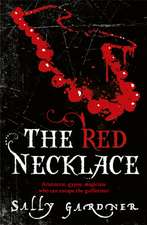Sphinx's Queen
Autor Esther M. Friesneren Limba Engleză Paperback – 31 aug 2011 – vârsta de la 12 ani
Overnight, every aspect of Nefertiti's life has changed. She is no longer living at the royal palace as the intended bride of the crown prince. Instead, she is being chased by the prince's soldiers for a crime she did not commit. Traveling with two of her dearest friends, including the crown prince's brother, Nefertiti takes shelter in the wild hills along the Nile's west bank. But she is determined to plead her case and set things right. As she begins to question long-held sacred beliefs—a questioning that could alter the fabric of Egyptian society—her extraordinary journey from commoner to royalty brings adventure, intrigue, and romance.
Preț: 84.56 lei
Nou
Puncte Express: 127
Preț estimativ în valută:
16.19€ • 17.59$ • 13.60£
16.19€ • 17.59$ • 13.60£
Carte disponibilă
Livrare economică 31 martie-14 aprilie
Preluare comenzi: 021 569.72.76
Specificații
ISBN-13: 9780375856587
ISBN-10: 0375856587
Pagini: 352
Dimensiuni: 142 x 210 x 21 mm
Greutate: 0.3 kg
Editura: Bluefire
ISBN-10: 0375856587
Pagini: 352
Dimensiuni: 142 x 210 x 21 mm
Greutate: 0.3 kg
Editura: Bluefire
Notă biografică
Nebula Award winner ESTHER FRIESNER is the author of more than 30 novels and over 150 short stories, including the story "Thunderbolt" in Random House's Young Warriors anthology, which lead to the creation of Nobody's Princess and Nobody's Prize. She is also the editor of seven popular anthologies. Her works have been published around the world. Educated at Vassar College and Yale University, where she taught for a number of years, Ms. Friesner is also a poet, a playwright, and once wrote an advice column, "Ask Auntie Esther." She is married, is the mother of two, harbors cats, and lives in Connecticut. You can visit Esther at: www.sff.net/people/e.friesner/.
Extras
Sunrise
Sunlight touched the western shore of the sacred river. I sat hugging Nava as we watched the beautiful return of light to the world. The nightmare that had disturbed my sleep on that first night of our escape from Thebes was gone. In my heart, I praised Ra, who had triumphed once more over the monsters of the underworld to steer his sun-ship safely back across the open sky.
“Are you all right?” Nava asked, gazing at me with a worried look that was much too old for such a little girl. “You were making a lot of noise. You must have had a very scary dream.”
“It was scary,” I replied, brushing a few stands of hair out of her eyes. “But it wasn’t all bad.”
“I heard you yell the evil prince’s name.” Nava pursed her lips, her small body radiating anger. She knew what Thutmose had done to me—condemned me for blasphemy, imprisoned me, tried to have me killed—and that he was the reason we’d fled Thebes last night. “A dream he’s in has to be all bad!”
“Not if I fought him”—I smiled—“and won.”
She tilted her head. “Did you?”
“I certainly did. First he tried to fool me; then he tried to harm me, but I defeated him. And do you know why I could do that?” Nava shook her head. “Because I wasn’t just fighting to save myself. You were in my dream as well, Nava, and I fought for you.”
“Oh, I know I was there,” she said, lifting her chin. “I heard you call my name, too. Did I help you?”
“In a way.”
“Hmph. That means I didn’t do anything, really.”
“Maybe next time I’ll have a dream where we fight together,” I said. “And isn’t it better to know that I can depend on your help when I’m awake?”
Nava wasn’t satisfied. “I want to help you always. At least you dreamed that you won. I’m glad. That means we’ll be safe, no matter what. Dreams don’t lie, not the really important ones.”
“So now you’re a dream-reader as well as a musician, Nava?” I teased her gently, the way I sometimes teased my little sister Bit-Bit. How I missed her!
Nava shook her head. “I wish I were. Dream-readers—even those who are slaves—can become very rich and important. Before she died, my mama used to tell us about one of our people, a Habiru slave who was a great dream-reader, long ago. He read Pharaoh’s dreams so well that he was given his freedom, and gold, and a big house, and a princess!”
“Those must have been very important dreams,” I said lightly.
“Oh, they were!” I was treating Nava’s tale as no more than a child’s fancy, but she was completely sincere. She believed in every word she told me. “Mama told us that those dreams saved the Black Land from a famine that lasted seven years.”
A wistful look came into her eyes. It was the first time I’d heard Nava talk about her mother.
I patted her shoulder. “Your mother knew very good stories, Nava. I hope you’ll tell me more of them someday.”
“It’s not a story,” she said, giving me a determined look. “It’s the truth.”
“What’s the truth?” a sleepy voice called out weakly from the far side of our dead campfire. With groans and moans, Prince Amenophis pushed himself up to sit cross-legged on the harsh ground. “Horus spare me, but my arms and legs feel ready to break before they bend normally again,” he muttered. “Ugh, what a night. Amun grant we don’t have to spend too many more like it before we reach Dendera.”
“How far is it from here?” I asked.
Amenophis shrugged his bony shoulders. “A few days.”
“How many?” I pressed. I was concerned, for his sake. After only one night away from the comforts of Thebes, he was starting to look haggard. The fewer days we’d have to travel, the better for him.
It was an innocent question, but it seemed to make Amenophis surprisingly uncomfortable. “I—I’m not sure. I’ve always been brought there in one of the royal ships. It was very pleasant, sailing down the sacred river, so I never paid much attention to how long the journey took.”
“Royal ships with oars and sails,” I remarked. “They’d go much faster than our little papyrus boat, but it’ll get us there all the same.”
“Is Dendera the only city we’ll pass?” Nava asked.
“Y-yes. I mean, I’m not sure about that, either. The last time I traveled there, I was much younger. Even though I wasn’t a child anymore, Mother kept sending me into the cabin for most of the trip. I think she was afraid I’d fall into the river if I wandered around the deck. Thutmose made fun of me, called me a little lotus petal.”
“He’s the lotus petal,” Nava decreed. “Not brave like us. He’d never leave the palace to help his friends.” She hugged me.
“Maybe not,” I said. “But he will leave the palace to come after me. If we don’t know how many days’ sail we’ve got ahead of us, we’d better start as soon as possible, to put plenty of distance between us and him.”
“Do we have to go right now?” Nava asked plaintively. “I’m hungry.”
I tousled her thick hair fondly. “Of course we’ll have breakfast first. We’ll just have it as quickly as possible.” I stood up and shook dust from my dress. The cloth was already much the worse for a night spent sleeping on the ground. I hoped it would hold together until Dendera. Clapping my hands, I turned to Amenophis and said, “Which bag shall I open for us? Where’s the bread packed?”
My friend began to chew on his lower lip nervously. His eyes darted to the bags of provisions he’d carried ashore from the humble boat that had ferried us across the sacred river. I watched his fingers curl and uncurl as he silently tallied the sacks, and I saw worry creep into his eyes. “That . . . that one has bread in it, I think,” he said, pointing unsteadily at one of the smaller bags. “Just take two pieces—four if they’re small. None for me, please. I’m . . . I’m not hungry.”
I opened the bag he indicated and took out two substantial loaves, round and golden brown. They were fresh enough to still be soft, though the rest of the bread we’d brought would soon turn so hard it would need to be soaked in water or beer before we could chew it. I gave one loaf to Nava, who sank her small white teeth into it greedily; then I tore the other loaf in half.
“Hungry or not, you’ll share this with me,” I said.
“No, really, I don’t want it.” He turned his face away, but I’d seen the longing in his eyes when he’d looked at the loaf. I could almost hear his stomach rumbling with early morning hunger. If he wasn’t famished, I was a frog.
“Then I don’t want it, either.”
“But you have to eat! You’ll get sick if you don’t.”
I thrust the bread at him again. “And you won’t?” Still he refused to accept it. The two of us stared at one another like a pair of goats head-to-head in a narrow alley, both too stubborn to budge.
“What’s the matter?” Nava had devoured her bread and was now looking at us unhappily, her small fist pressed so tightly to her mouth that I could hardly understand her words. “Why are you fighting?”
“We’re not fighting.” Amenophis and I replied in such perfect unison that the silliness of our situation struck us both at once, and we burst into laughter.
Reluctantly, he stretched out his hand. “I’ll eat if you will.”
“Me too.”
While we had our meager breakfast, I scanned the pile of sacks on shore and grew thoughtful. “Nava, would you like to help us get ready to go?” I asked casually. “You could start loading the boat. We’ll help you once we’re done eating.” Her response was so eager I had to caution her to carry just one bag at a time. While she scrambled back and forth, stowing our provisions, I was able to speak privately with Amenophis.
“I know what’s bothering you,” I said quietly. “You’re afraid we won’t have enough food to get us to Dendera.”
“Was I that obvious?” he said sadly.
“I saw how you looked at the bags. I could almost read your thoughts, tallying the food against the number of days we’ve got to travel and dividing everything among the three of us.”
He hung his head. “I didn’t want you to worry. It wouldn’t be so bad if I knew exactly how long we’ll have to sail. If you and Nava go hungry, it’ll be all my fault.”
“If any of us go hungry, it will be our own fault for starving in the middle of a feast,” I replied. “Even if Dendera lies a hundred days’ sailing from here, we don’t need to worry about food or drink. Look there.” I gestured at the sacred river. “Not even the gods could drink all of that, and it’s full of fish. If the three of us go after them together, we’ll have to catch something. It might even be fun.”
“Yes, that’s true.” A glimmer of renewed confidence touched his eyes. “I’ve never fished before, either, though I have gone hunting in the marshes. I have a good eye, a good aim.” In an instant, the glimmer faded. “But I’m not half as skilled as Thutmose is with the spear.”
“Well, you’re going to be better than he is when it comes to fishing!” I decreed.
“Have you ever gone fishing, Nefertiti?” Amenophis asked hopefully.
I had to admit that I’d never tried it. “But I have seen how it’s done,” I told him quickly to keep him in good spirits. “Father and I saw them hard at work almost every day. Some of the men used nets, and some used spears. If we can’t find any wood long or straight enough to make our fishing spears, we’ll hunt through the reeds until we find some that are stiff enough to hold a sharp point.”
“If we do find wood, I could try to make myself a throwing stick, for hunting waterfowl.” He sounded as if he were catching my enthusiasm.
“Exactly! And maybe we could also make a bow and arrow for me to use. You know I’m not a bad shot. I’m not sure if I could hit a moving target, but if I come across a bird that’s polite enough to stand still and wait for my arrow . . .” It did me good to hear him laugh at my little joke. “As for the fish, I’m going to see if I can turn one of our food bags into a net, or a scoop, or—or something that’ll catch them. If the first thing we try doesn’t work, we’ll just have to come up with a new idea, and if that fails, we’ll think of another. I’m not going to give up, and we’re not going to go hungry.” He smiled. “When I listen to you, I can almost believe that we’ll arrive at Dendera with a boatload of fish and game.”
I wrinkled my nose. “I don’t think your mother would like the smell of that.” I laughed, expecting him to join in, but this time he kept silent. A shadow had fallen over him again. It pained my heart to see him so downcast. Gently I reached for his hand, but he moved away.
“This is the least of our troubles,” he muttered. “Fish or no fish, it doesn’t matter. What have I done to you, Nefertiti? What was I thinking when I brought you away from Thebes?” His words sounded hollow and desolate.
“You were saving my life; that’s what you were thinking,” I replied, speaking softly so that Nava wouldn’t overhear. I was becoming more and more concerned about Amenophis. Whatever was preying on his spirit, I had to make him tell me before it gnawed him to pieces inside. “If you hadn’t carried me across the river, out of your brother’s power, I’d be dead by the time your parents returned.”
“Don’t say such things.” He shook his head violently. “I can’t stand the thought of anything happening to you, my—my friend, my dear friend. O gods, help me!” He groaned. “Why wasn’t I born like Thutmose, strong and sure of myself?? It’s one thing to get that little boat across the sacred river, but to steer it for days? I don’t know if I can do it, and now I must.”
He grabbed my hands, clasping them fiercely between his own. “What good was it to break you out of your prison if Thutmose recaptures you because I wasn’t smart or strong enough to keep you out of his hands? I should have paid one of the palace guards to take you far away from here, far from Thebes, even far beyond the borders of the Black Land itself.” He bowed his head. “But I was selfish. I wanted to be the one to save you, not some paid servant. And I dreaded the thought of never seeing you again. It’s my selfishness that’s put your life at risk—and not just yours!” He cast worried eyes to where Nava was still happily distracted with loading our boat of bundled reeds.
I squeezed Amenophis’s thin hands as hard as I could, so hard that I felt the bones move against each other. He gasped, shocked by the unexpected pain. “Stop it,” I said firmly, scowling at him as hard as I could. “Stop filling your mind with these thoughts. They’ll drag all three of us to the river bottom. Amenophis, look there, look at the sun, how beautiful it is, how the Aten-disck shines, chasing away the shadows and bad dreams and dangers of the night! If not for you and Nava and Sitamun, I might not be here today, welcoming the Aten’s light. How can you say you were selfish, after all you’ve done to help me? My friend, you’re risking much more than I am.”
“Impossible,” he replied, bewildered. “Your life’s in danger—”
“And yours,” I cut in. “Maybe more than mine.”
He shook his head again. “No matter how much Thutmose hates me for thwarting his plans, there’s a limit to how much he can punish me. I’m his brother.”
“Set was Osiris’s brother,” I murmured.
We both knew the story of how the evil god of the wastelands grew envious of his brother Osiris, the beloved husband of Isis. Set killed Osiris, and in his murderous rage, he tore his brother’s body to pieces and scattered them throughout the Black Land. Sweet Isis had to seek the pieces everywhere until she had them all. With her own hands, she put them back together, wrapping them into place with strips of linen, then used her magic to revive him. So Isis taught mortals the way for preserving and preparing the dead for eternity. Osiris returned to life, to reign as lord of the underworld, in spite of his brother’s evil.
Osiris was a god. Amenophis was not. He wouldn’t even be the god-on-earth that Thutmose would become when he inherited his father’s crown. If his brother destroyed him, it would be forever.
“Thutmose can’t hurt me the way he can hurt you or Nava,” Amenophis maintained. “You two are at much more risk than I am, out here with only—only me to protect you. I should have let someone stronger take care of you.”
I squeezed his hand again. “Does that feel weak?” I demanded. “I may like to spend my time with Henenu, learning the scribe’s art, but that’s not all I can do. And Nava isn’t some sheltered, pampered infant. She was born a slave, and she’s lived a slave’s hard life. Her sister . . .” I felt a pang, remembering how Nava’s sister Mahala had saved my life, and the horror that struck my heart when I heard she’d been killed for that. “Her sister’s death shattered her, stole her voice, but she found the strength to come back from that ordeal. None of us are weaklings, Amenophis, least of all you! We’ll protect each other.”
This time, my friend’s smile was more certain. “I think that you’ll be the one protecting us all, Nefertiti.”
That made me laugh. “You expect too much from me, but thank you. Now, let’s help Nava load the boat or she’ll be mad at us for making her do all the work.”
“Oh, I wouldn’t want to feel her wrath,” Amenophis joked.
Together we got busy carrying the last few bags to the reed boat, then set Nava in the prow and launched our vessel back onto the sacred river.
How fortunate we were to be sailing downstream! We didn’t have to fight the current—no easy task without a sail to steal the wind. All we had to do was steer. Nava kept her seat in the prow of the boat, Amenophis guided us from the stern, and I sat midway between the two of them, enthroned in a nest of provision bags. How very different from the way I’d come to Thebes, riding with my family amid the luxuries of my aunt Tiye’s regal ship. But except for wishing that Father and my second mother, Mery, and my sister Bit-Bit were still here with me, I wouldn’t have traded places with my then-self for a double handful of gold. Then I’d been as much of a captive as Nava, being dragged to a marriage I didn’t want to a boy I’d learned I could never love. Now I was free.
As the sun rose higher, the river came to life. Flights of egrets rose out of the reeds when our little boat came too close for their liking. Their plumage made white streaks across the bright blue sky. Little green herons peered at us curiously for a moment from the shallows and then went back to feeding. Sometimes I thought I saw the darting brilliance of a kingfisher’s wings, and once, Nava came scrambling over the food sacks to tug my hand and point eagerly at the magnificent sight of a falcon with outstretched wings. He rode the heavens with kingly calm, without the frantic wing-beating of lesser birds, as if the sky itself balanced on the tips of his golden-brown feathers. Without warning, he folded his wings and plunged to snatch a fish from the river. The ripples of his strike lapped against our boat as he flew away to enjoy his silvery, squirming feast.
We weren’t the only ones sailing on the sacred river—how could we be? This was the heart and spirit of the Black Land, the realm of the god Hapy, whose timely floods renewed the fields and fed us. Our small boat was one of countless others, watercraft of all sizes, some under sail, some driven by oars, some carried along by both. Upstream and downstream, the peacefully flowing water was a wonderful confusion of people, ships, livestock, the sweet scent of spices or incense wafting from a merchant’s vessel, the lively music of the boatmen’s work songs, the cry of a baby, the laughter of a child.
I marveled at the spectacle and power of the sacred river. Not so long ago, I’d stood helpless in the house of Isis, back in Akhmin, while the goddess’s chief priest took cruel joy in telling me that Mahala was dead. The slave girl had saved me from drowning, but for his own malicious reasons, the priest declared that she’d cheated Hapy of his chosen sacrifice. No doubt he’d seen to it that she was given to the river-god in my place.
And yet here was Nava, sailing happily, fearlessly, along the same waters that had claimed her beloved sister. I quietly gave thanks to Isis for having healed the little girl’s heart. Nava was so at ease on our boat, as though she’d been born the life of the river. She was captivated by everything she saw. She even pointed out a bank where a raft of crocodiles lay dozing, baking their scaly backs in the sun. One of the biggest of them sprawled lazily, his deadly jaws gaping wide while a tiny brown bird hopped here and there, picking bits of food out of the monster’s teeth.
From the Hardcover edition.
Sunlight touched the western shore of the sacred river. I sat hugging Nava as we watched the beautiful return of light to the world. The nightmare that had disturbed my sleep on that first night of our escape from Thebes was gone. In my heart, I praised Ra, who had triumphed once more over the monsters of the underworld to steer his sun-ship safely back across the open sky.
“Are you all right?” Nava asked, gazing at me with a worried look that was much too old for such a little girl. “You were making a lot of noise. You must have had a very scary dream.”
“It was scary,” I replied, brushing a few stands of hair out of her eyes. “But it wasn’t all bad.”
“I heard you yell the evil prince’s name.” Nava pursed her lips, her small body radiating anger. She knew what Thutmose had done to me—condemned me for blasphemy, imprisoned me, tried to have me killed—and that he was the reason we’d fled Thebes last night. “A dream he’s in has to be all bad!”
“Not if I fought him”—I smiled—“and won.”
She tilted her head. “Did you?”
“I certainly did. First he tried to fool me; then he tried to harm me, but I defeated him. And do you know why I could do that?” Nava shook her head. “Because I wasn’t just fighting to save myself. You were in my dream as well, Nava, and I fought for you.”
“Oh, I know I was there,” she said, lifting her chin. “I heard you call my name, too. Did I help you?”
“In a way.”
“Hmph. That means I didn’t do anything, really.”
“Maybe next time I’ll have a dream where we fight together,” I said. “And isn’t it better to know that I can depend on your help when I’m awake?”
Nava wasn’t satisfied. “I want to help you always. At least you dreamed that you won. I’m glad. That means we’ll be safe, no matter what. Dreams don’t lie, not the really important ones.”
“So now you’re a dream-reader as well as a musician, Nava?” I teased her gently, the way I sometimes teased my little sister Bit-Bit. How I missed her!
Nava shook her head. “I wish I were. Dream-readers—even those who are slaves—can become very rich and important. Before she died, my mama used to tell us about one of our people, a Habiru slave who was a great dream-reader, long ago. He read Pharaoh’s dreams so well that he was given his freedom, and gold, and a big house, and a princess!”
“Those must have been very important dreams,” I said lightly.
“Oh, they were!” I was treating Nava’s tale as no more than a child’s fancy, but she was completely sincere. She believed in every word she told me. “Mama told us that those dreams saved the Black Land from a famine that lasted seven years.”
A wistful look came into her eyes. It was the first time I’d heard Nava talk about her mother.
I patted her shoulder. “Your mother knew very good stories, Nava. I hope you’ll tell me more of them someday.”
“It’s not a story,” she said, giving me a determined look. “It’s the truth.”
“What’s the truth?” a sleepy voice called out weakly from the far side of our dead campfire. With groans and moans, Prince Amenophis pushed himself up to sit cross-legged on the harsh ground. “Horus spare me, but my arms and legs feel ready to break before they bend normally again,” he muttered. “Ugh, what a night. Amun grant we don’t have to spend too many more like it before we reach Dendera.”
“How far is it from here?” I asked.
Amenophis shrugged his bony shoulders. “A few days.”
“How many?” I pressed. I was concerned, for his sake. After only one night away from the comforts of Thebes, he was starting to look haggard. The fewer days we’d have to travel, the better for him.
It was an innocent question, but it seemed to make Amenophis surprisingly uncomfortable. “I—I’m not sure. I’ve always been brought there in one of the royal ships. It was very pleasant, sailing down the sacred river, so I never paid much attention to how long the journey took.”
“Royal ships with oars and sails,” I remarked. “They’d go much faster than our little papyrus boat, but it’ll get us there all the same.”
“Is Dendera the only city we’ll pass?” Nava asked.
“Y-yes. I mean, I’m not sure about that, either. The last time I traveled there, I was much younger. Even though I wasn’t a child anymore, Mother kept sending me into the cabin for most of the trip. I think she was afraid I’d fall into the river if I wandered around the deck. Thutmose made fun of me, called me a little lotus petal.”
“He’s the lotus petal,” Nava decreed. “Not brave like us. He’d never leave the palace to help his friends.” She hugged me.
“Maybe not,” I said. “But he will leave the palace to come after me. If we don’t know how many days’ sail we’ve got ahead of us, we’d better start as soon as possible, to put plenty of distance between us and him.”
“Do we have to go right now?” Nava asked plaintively. “I’m hungry.”
I tousled her thick hair fondly. “Of course we’ll have breakfast first. We’ll just have it as quickly as possible.” I stood up and shook dust from my dress. The cloth was already much the worse for a night spent sleeping on the ground. I hoped it would hold together until Dendera. Clapping my hands, I turned to Amenophis and said, “Which bag shall I open for us? Where’s the bread packed?”
My friend began to chew on his lower lip nervously. His eyes darted to the bags of provisions he’d carried ashore from the humble boat that had ferried us across the sacred river. I watched his fingers curl and uncurl as he silently tallied the sacks, and I saw worry creep into his eyes. “That . . . that one has bread in it, I think,” he said, pointing unsteadily at one of the smaller bags. “Just take two pieces—four if they’re small. None for me, please. I’m . . . I’m not hungry.”
I opened the bag he indicated and took out two substantial loaves, round and golden brown. They were fresh enough to still be soft, though the rest of the bread we’d brought would soon turn so hard it would need to be soaked in water or beer before we could chew it. I gave one loaf to Nava, who sank her small white teeth into it greedily; then I tore the other loaf in half.
“Hungry or not, you’ll share this with me,” I said.
“No, really, I don’t want it.” He turned his face away, but I’d seen the longing in his eyes when he’d looked at the loaf. I could almost hear his stomach rumbling with early morning hunger. If he wasn’t famished, I was a frog.
“Then I don’t want it, either.”
“But you have to eat! You’ll get sick if you don’t.”
I thrust the bread at him again. “And you won’t?” Still he refused to accept it. The two of us stared at one another like a pair of goats head-to-head in a narrow alley, both too stubborn to budge.
“What’s the matter?” Nava had devoured her bread and was now looking at us unhappily, her small fist pressed so tightly to her mouth that I could hardly understand her words. “Why are you fighting?”
“We’re not fighting.” Amenophis and I replied in such perfect unison that the silliness of our situation struck us both at once, and we burst into laughter.
Reluctantly, he stretched out his hand. “I’ll eat if you will.”
“Me too.”
While we had our meager breakfast, I scanned the pile of sacks on shore and grew thoughtful. “Nava, would you like to help us get ready to go?” I asked casually. “You could start loading the boat. We’ll help you once we’re done eating.” Her response was so eager I had to caution her to carry just one bag at a time. While she scrambled back and forth, stowing our provisions, I was able to speak privately with Amenophis.
“I know what’s bothering you,” I said quietly. “You’re afraid we won’t have enough food to get us to Dendera.”
“Was I that obvious?” he said sadly.
“I saw how you looked at the bags. I could almost read your thoughts, tallying the food against the number of days we’ve got to travel and dividing everything among the three of us.”
He hung his head. “I didn’t want you to worry. It wouldn’t be so bad if I knew exactly how long we’ll have to sail. If you and Nava go hungry, it’ll be all my fault.”
“If any of us go hungry, it will be our own fault for starving in the middle of a feast,” I replied. “Even if Dendera lies a hundred days’ sailing from here, we don’t need to worry about food or drink. Look there.” I gestured at the sacred river. “Not even the gods could drink all of that, and it’s full of fish. If the three of us go after them together, we’ll have to catch something. It might even be fun.”
“Yes, that’s true.” A glimmer of renewed confidence touched his eyes. “I’ve never fished before, either, though I have gone hunting in the marshes. I have a good eye, a good aim.” In an instant, the glimmer faded. “But I’m not half as skilled as Thutmose is with the spear.”
“Well, you’re going to be better than he is when it comes to fishing!” I decreed.
“Have you ever gone fishing, Nefertiti?” Amenophis asked hopefully.
I had to admit that I’d never tried it. “But I have seen how it’s done,” I told him quickly to keep him in good spirits. “Father and I saw them hard at work almost every day. Some of the men used nets, and some used spears. If we can’t find any wood long or straight enough to make our fishing spears, we’ll hunt through the reeds until we find some that are stiff enough to hold a sharp point.”
“If we do find wood, I could try to make myself a throwing stick, for hunting waterfowl.” He sounded as if he were catching my enthusiasm.
“Exactly! And maybe we could also make a bow and arrow for me to use. You know I’m not a bad shot. I’m not sure if I could hit a moving target, but if I come across a bird that’s polite enough to stand still and wait for my arrow . . .” It did me good to hear him laugh at my little joke. “As for the fish, I’m going to see if I can turn one of our food bags into a net, or a scoop, or—or something that’ll catch them. If the first thing we try doesn’t work, we’ll just have to come up with a new idea, and if that fails, we’ll think of another. I’m not going to give up, and we’re not going to go hungry.” He smiled. “When I listen to you, I can almost believe that we’ll arrive at Dendera with a boatload of fish and game.”
I wrinkled my nose. “I don’t think your mother would like the smell of that.” I laughed, expecting him to join in, but this time he kept silent. A shadow had fallen over him again. It pained my heart to see him so downcast. Gently I reached for his hand, but he moved away.
“This is the least of our troubles,” he muttered. “Fish or no fish, it doesn’t matter. What have I done to you, Nefertiti? What was I thinking when I brought you away from Thebes?” His words sounded hollow and desolate.
“You were saving my life; that’s what you were thinking,” I replied, speaking softly so that Nava wouldn’t overhear. I was becoming more and more concerned about Amenophis. Whatever was preying on his spirit, I had to make him tell me before it gnawed him to pieces inside. “If you hadn’t carried me across the river, out of your brother’s power, I’d be dead by the time your parents returned.”
“Don’t say such things.” He shook his head violently. “I can’t stand the thought of anything happening to you, my—my friend, my dear friend. O gods, help me!” He groaned. “Why wasn’t I born like Thutmose, strong and sure of myself?? It’s one thing to get that little boat across the sacred river, but to steer it for days? I don’t know if I can do it, and now I must.”
He grabbed my hands, clasping them fiercely between his own. “What good was it to break you out of your prison if Thutmose recaptures you because I wasn’t smart or strong enough to keep you out of his hands? I should have paid one of the palace guards to take you far away from here, far from Thebes, even far beyond the borders of the Black Land itself.” He bowed his head. “But I was selfish. I wanted to be the one to save you, not some paid servant. And I dreaded the thought of never seeing you again. It’s my selfishness that’s put your life at risk—and not just yours!” He cast worried eyes to where Nava was still happily distracted with loading our boat of bundled reeds.
I squeezed Amenophis’s thin hands as hard as I could, so hard that I felt the bones move against each other. He gasped, shocked by the unexpected pain. “Stop it,” I said firmly, scowling at him as hard as I could. “Stop filling your mind with these thoughts. They’ll drag all three of us to the river bottom. Amenophis, look there, look at the sun, how beautiful it is, how the Aten-disck shines, chasing away the shadows and bad dreams and dangers of the night! If not for you and Nava and Sitamun, I might not be here today, welcoming the Aten’s light. How can you say you were selfish, after all you’ve done to help me? My friend, you’re risking much more than I am.”
“Impossible,” he replied, bewildered. “Your life’s in danger—”
“And yours,” I cut in. “Maybe more than mine.”
He shook his head again. “No matter how much Thutmose hates me for thwarting his plans, there’s a limit to how much he can punish me. I’m his brother.”
“Set was Osiris’s brother,” I murmured.
We both knew the story of how the evil god of the wastelands grew envious of his brother Osiris, the beloved husband of Isis. Set killed Osiris, and in his murderous rage, he tore his brother’s body to pieces and scattered them throughout the Black Land. Sweet Isis had to seek the pieces everywhere until she had them all. With her own hands, she put them back together, wrapping them into place with strips of linen, then used her magic to revive him. So Isis taught mortals the way for preserving and preparing the dead for eternity. Osiris returned to life, to reign as lord of the underworld, in spite of his brother’s evil.
Osiris was a god. Amenophis was not. He wouldn’t even be the god-on-earth that Thutmose would become when he inherited his father’s crown. If his brother destroyed him, it would be forever.
“Thutmose can’t hurt me the way he can hurt you or Nava,” Amenophis maintained. “You two are at much more risk than I am, out here with only—only me to protect you. I should have let someone stronger take care of you.”
I squeezed his hand again. “Does that feel weak?” I demanded. “I may like to spend my time with Henenu, learning the scribe’s art, but that’s not all I can do. And Nava isn’t some sheltered, pampered infant. She was born a slave, and she’s lived a slave’s hard life. Her sister . . .” I felt a pang, remembering how Nava’s sister Mahala had saved my life, and the horror that struck my heart when I heard she’d been killed for that. “Her sister’s death shattered her, stole her voice, but she found the strength to come back from that ordeal. None of us are weaklings, Amenophis, least of all you! We’ll protect each other.”
This time, my friend’s smile was more certain. “I think that you’ll be the one protecting us all, Nefertiti.”
That made me laugh. “You expect too much from me, but thank you. Now, let’s help Nava load the boat or she’ll be mad at us for making her do all the work.”
“Oh, I wouldn’t want to feel her wrath,” Amenophis joked.
Together we got busy carrying the last few bags to the reed boat, then set Nava in the prow and launched our vessel back onto the sacred river.
How fortunate we were to be sailing downstream! We didn’t have to fight the current—no easy task without a sail to steal the wind. All we had to do was steer. Nava kept her seat in the prow of the boat, Amenophis guided us from the stern, and I sat midway between the two of them, enthroned in a nest of provision bags. How very different from the way I’d come to Thebes, riding with my family amid the luxuries of my aunt Tiye’s regal ship. But except for wishing that Father and my second mother, Mery, and my sister Bit-Bit were still here with me, I wouldn’t have traded places with my then-self for a double handful of gold. Then I’d been as much of a captive as Nava, being dragged to a marriage I didn’t want to a boy I’d learned I could never love. Now I was free.
As the sun rose higher, the river came to life. Flights of egrets rose out of the reeds when our little boat came too close for their liking. Their plumage made white streaks across the bright blue sky. Little green herons peered at us curiously for a moment from the shallows and then went back to feeding. Sometimes I thought I saw the darting brilliance of a kingfisher’s wings, and once, Nava came scrambling over the food sacks to tug my hand and point eagerly at the magnificent sight of a falcon with outstretched wings. He rode the heavens with kingly calm, without the frantic wing-beating of lesser birds, as if the sky itself balanced on the tips of his golden-brown feathers. Without warning, he folded his wings and plunged to snatch a fish from the river. The ripples of his strike lapped against our boat as he flew away to enjoy his silvery, squirming feast.
We weren’t the only ones sailing on the sacred river—how could we be? This was the heart and spirit of the Black Land, the realm of the god Hapy, whose timely floods renewed the fields and fed us. Our small boat was one of countless others, watercraft of all sizes, some under sail, some driven by oars, some carried along by both. Upstream and downstream, the peacefully flowing water was a wonderful confusion of people, ships, livestock, the sweet scent of spices or incense wafting from a merchant’s vessel, the lively music of the boatmen’s work songs, the cry of a baby, the laughter of a child.
I marveled at the spectacle and power of the sacred river. Not so long ago, I’d stood helpless in the house of Isis, back in Akhmin, while the goddess’s chief priest took cruel joy in telling me that Mahala was dead. The slave girl had saved me from drowning, but for his own malicious reasons, the priest declared that she’d cheated Hapy of his chosen sacrifice. No doubt he’d seen to it that she was given to the river-god in my place.
And yet here was Nava, sailing happily, fearlessly, along the same waters that had claimed her beloved sister. I quietly gave thanks to Isis for having healed the little girl’s heart. Nava was so at ease on our boat, as though she’d been born the life of the river. She was captivated by everything she saw. She even pointed out a bank where a raft of crocodiles lay dozing, baking their scaly backs in the sun. One of the biggest of them sprawled lazily, his deadly jaws gaping wide while a tiny brown bird hopped here and there, picking bits of food out of the monster’s teeth.
From the Hardcover edition.
